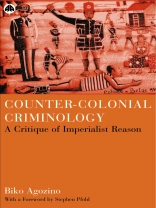This book is about how the history of colonialism has shaped the definition of crime and justice systems not only in former colonies but also in colonialist countries. Biko Agozino argues that criminology in the West was originally tested in the colonies and then brought back to mother countries – in this way, he claims, the colonial experience has been instrumental in shaping modern criminology in colonial powers.
He looks at how radical critiques of mainstream criminology by critical feminist and postmodernist thinkers contribute to an understanding of the relationship between colonial experience and criminology. But he also shows that even critical feminist and postmodernist assessments of conventional criminology do not go far enough as they remain virtually silent on colonial issues.
Biko Agozino considers African and other postcolonial literature and contributions to counter colonial criminology, their originality, relevance and limitations. Finally he advocates a ‘committed objectivity’ approach to race-class-gender criminology investigations in order to come to terms with imperialistic and neo-colonialist criminology.
Table of Content
Acknowledgement
Table of contents
Introduction
1. The Enlightenment and Euro American Theories of the Judicial Process
2. From Determinism to Meaning: The Emergence of Labeling Perspective
3. From Societal Reaction to Questions of Power: From Labelling to Radical Criminology
4. Feminist Perspectives and Critical Criminology
5. Lesbian Rape: Maternal Metaphors for the Patriarchal State and International Conflict Resolution
6. Post-Structuralism and Positivism in Criminological Theory
7. Social Fiction Sui Generis: The Fairy Tale Structure of Criminological Theory
8. Executive lawlessness and the struggle for democracy in Africa
9. Radical Criminology In African Literature’
10. Committed Objectivity in Race-Class-Gender Research
11. How Scientific is Criminal Justice? A Methodological Critique of research on Mc Cleskey V. Kemp and other capital cases.
12. What is Institutionalised? The Race-Class-Gender Articulation of Stephen Lawrence’
13. ‘Criminal Records: The Toughest, The Police and The Thieves; The Policing of Peter Tosh and Popular Culture’
Conclusion: Beyond Criminological Orientalism.
Bibliography
About The Author
Endonotes
About the author
Biko Agozino is professor of criminology at the University of West Indies. He is the author of Black Women and the Criminal Justice System (Ashgate, 1997), Counter-Colonial Criminology (Pluto, 2003), and editor of Theoretical and Methodological Issues in Migration Research (Ashgate, 2000).












